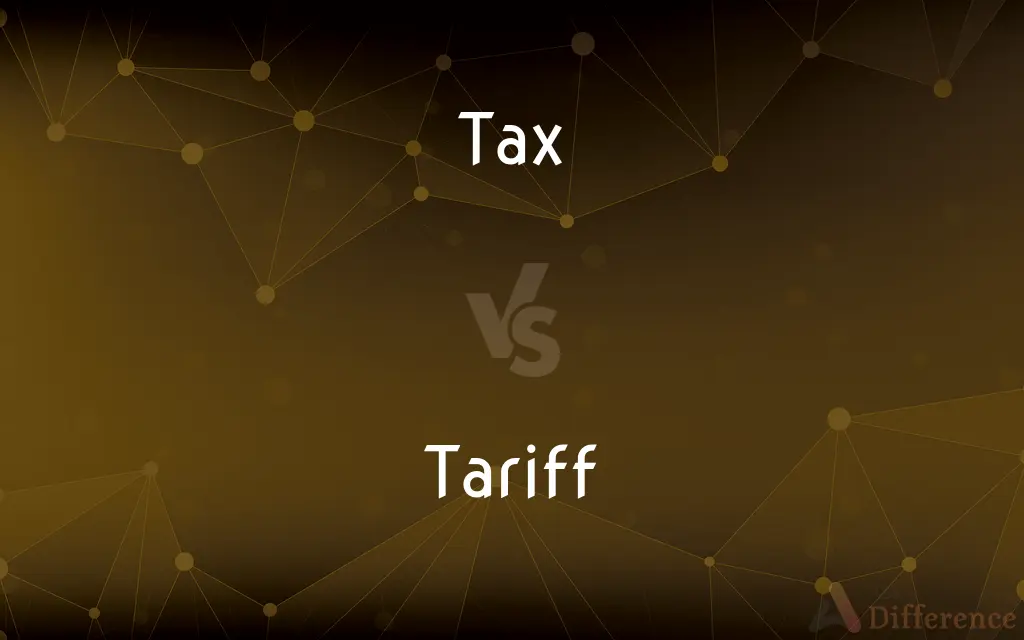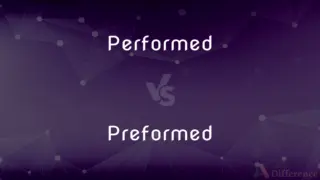Tax vs. Tariff — What's the Difference?
By Tayyaba Rehman — Updated on November 3, 2023
Tax is a compulsory financial charge imposed by a government on individuals or entities, while a tariff is a tax on imported or exported goods.

Difference Between Tax and Tariff
Table of Contents
ADVERTISEMENT
Key Differences
Taxes and tariffs are both forms of revenue for governments but serve different functions. A tax is a compulsory charge levied by a government on income, property, goods, or services to finance government activities. A tariff, on the other hand, is specifically a tax on imports or exports between sovereign states. Taxes apply to domestic transactions and events, whereas tariffs are specific to international trade.
Both taxes and tariffs can influence the economy, but they do so in different contexts. Taxes affect individual income, corporate earnings, and the price levels of goods and services within a country. Tariffs are used to control cross-border trade, influence the balance of trade, and protect domestic industries from foreign competition. While taxes are a tool for domestic policy, tariffs are a tool for trade policy.
The imposition of taxes and tariffs can lead to different economic behaviors. Taxes can encourage or discourage certain decisions by individuals or businesses through incentives or disincentives. Tariffs can make imported goods more expensive, encouraging consumers to buy domestic products. In this sense, taxes can affect broad aspects of economic life, while tariffs are targeted at specific sectors related to international trade.
Revenue generated from taxes is generally used to fund a wide range of government services like education, health care, and infrastructure. Tariff revenue, while also contributing to national income, can also serve as a barrier to control the quantity of goods coming into a country. This highlights the dual role of tariffs: generating income and regulating trade.
Tax policy is often a matter of domestic political debate, reflecting the social and economic priorities of a country. Tariff policy, while also domestically influenced, is additionally shaped by international relations and trade agreements. Thus, the impact and considerations of taxes and tariffs are situated within different spheres of governmental policy-making.
ADVERTISEMENT
Comparison Chart
Definition
A compulsory contribution to state revenue
A tax imposed on imported and exported goods
Levied on
Income, property, sales, etc.
International trade
Purpose
Fund government services, redistribute wealth
Protect domestic industries, regulate trade
Impact
Affects national economy, influences behavior
Affects trade balance, price of imports/exports
Variation
Can be progressive, regressive, proportional
Usually a fixed rate per unit or ad valorem (percentage)
Compare with Definitions
Tax
A financial charge imposed by the state.
The new luxury tax affected sales of high-end cars.
Tariff
A tax assessed by authorities on imports or exports.
The latest tariff on electronics disrupted the supply chain.
Tax
A contribution for the support of governmental operations.
Small businesses often struggle with the complexity of tax codes.
Tariff
A list or table of prices for such duties.
Importers scrutinized the tariff to determine the impact on costs.
Tax
A fiscal burden placed upon individuals or property.
Property tax assessments have increased this year due to rising home values.
Tariff
A statutory rate of taxation on goods crossing borders.
The government implemented a tariff on luxury goods to reduce imports.
Tax
A tax is a compulsory financial charge or some other type of levy imposed on a taxpayer (an individual or legal entity) by a governmental organization in order to fund government spending and various public expenditures. A failure to pay, along with evasion of or resistance to taxation, is punishable by law.
Tariff
A tariff is a tax imposed by a government of a country or of a supranational union on imports or exports of goods. Besides being a source of revenue for the government, import duties can also be a form of regulation of foreign trade and policy that taxes foreign products to encourage or safeguard domestic industry.
Tax
A compulsory contribution to state revenue, levied by the government on workers' income and business profits, or added to the cost of some goods, services, and transactions
A tax bill
Higher taxes will dampen consumer spending
A tax on fuel
Tax cuts
They will have to pay tax on interest earned by savings
Tariff
A list or system of duties imposed by a government on imported or exported goods.
Tax
A strain or heavy demand
A heavy tax on the reader's attention
Tariff
A duty or duties so imposed.
Tax
Impose a tax on (someone or something)
The income will be taxed at the top rate
Tariff
A schedule of prices or fees.
Tax
Make heavy demands on (someone's powers or resources)
She knew that the ordeal to come must tax all her strength
Tariff
To fix a duty or price on.
Tax
Confront (someone) with a fault or wrongdoing
Why are you taxing me with these preposterous allegations?
Tariff
A system of government-imposed duties levied on imported or exported goods; a list of such duties, or the duties themselves.
Tax
Examine and assess (the costs of a case)
An officer taxing a bill of costs
Tariff
A schedule of rates, fees or prices.
Tax
A contribution for the support of a government required of persons, groups, or businesses within the domain of that government.
Tariff
(British) A sentence determined according to a scale of standard penalties for certain categories of crime.
Tax
A fee or dues levied on the members of an organization to meet its expenses.
Tariff
(transitive) to levy a duty on (something)
Tax
A burdensome or excessive demand; a strain.
Tariff
A schedule, system, or scheme of duties imposed by the government of a country upon goods imported or exported; as, a revenue tariff; a protective tariff; Clay's compromise tariff. (U. S. 1833).
Tax
To place a tax on (income, property, or goods).
Tariff
The duty, or rate of duty, so imposed; as, the tariff on wool; a tariff of two cents a pound.
Tax
To exact a tax from
Taxed the people.
Tariff
Any schedule or system of rates, changes, etc.; as, a tariff of fees, or of railroad fares.
Tax
(Law) To assess (court costs, for example).
Tariff
To make a list of duties on, as goods.
Tax
To make difficult or excessive demands upon
A boss who taxed everyone's patience.
Tariff
A government tax on imports or exports;
They signed a treaty to lower duties on trade between their countries
Tax
To accuse; confront
Taxed him with ingratitude.
Tariff
Charge a tariff;
Tariff imported goods
Tax
To hold accountable
The contractor was taxed with the mistake of the subcontractor.
Tariff
A schedule of duties imposed by a government on imported goods.
The new tariff on steel imports sparked controversy among manufacturers.
Tax
Money paid to the government other than for transaction-specific goods and services.
Tariff
A governmental tool for regulating international trade.
The international dispute arose after the sudden increase in the corn tariff.
Tax
A burdensome demand.
A heavy tax on time or health
Tax
A task exacted from one who is under control; a contribution or service, the rendering of which is imposed upon a subject.
Tax
(obsolete) charge; censure
Tax
(transitive) To impose and collect a tax from (a person or company).
Some think to tax the wealthy is the fairest.
Tax
(transitive) To impose and collect a tax on (something).
Some think to tax wealth is destructive of a private sector.
Tax
(transitive) To make excessive demands on.
Do not tax my patience.
Tax
(transitive) To accuse.
Tax
(transitive) To examine accounts in order to allow or disallow items.
Tax
A charge, especially a pecuniary burden which is imposed by authority.
Tax
A charge or burden laid upon persons or property for the support of a government.
A farmer of taxes is, of all creditors, proverbially the most rapacious.
Tax
A task exacted from one who is under control; a contribution or service, the rendering of which is imposed upon a subject.
Tax
Especially, the sum laid upon specific things, as upon polls, lands, houses, income, etc.; as, a land tax; a window tax; a tax on carriages, and the like.
Tax
A disagreeable or burdensome duty or charge; as, a heavy tax on time or health.
Tax
A sum imposed or levied upon the members of a society to defray its expenses.
Tax
Charge; censure.
Tax
A lesson to be learned; a task.
Tax
To subject to the payment of a tax or taxes; to impose a tax upon; to lay a burden upon; especially, to exact money from for the support of government.
We are more heavily taxed by our idleness, pride, and folly than we are taxed by government.
Tax
To assess, fix, or determine judicially, the amount of; as, to tax the cost of an action in court.
Tax
To charge; to accuse; also, to censure; - often followed by with, rarely by of before an indirect object; as, to tax a man with pride.
I tax you, you elements, with unkindness.
Men's virtues I have commended as freely as I have taxed their crimes.
Fear not now that men should tax thine honor.
Tax
Charge against a citizen's person or property or activity for the support of government
Tax
Levy a tax on;
The State taxes alcohol heavily
Clothing is not taxed in our state
Tax
Set or determine the amount of (a payment such as a fine)
Tax
Use to the limit;
You are taxing my patience
Tax
Make a charge against or accuse;
They taxed him failure to appear in court
Tax
A mandatory payment to the government.
The income tax deadline is April 15th every year.
Tax
A means of raising revenue for public purposes.
Tax incentives were introduced to boost renewable energy investments.
Common Curiosities
Why do governments impose taxes?
Governments impose taxes to generate revenue for funding public services and infrastructure, and sometimes to influence economic behavior.
What is a tariff?
A tariff is a tax imposed on goods when they are moved across a political boundary.
Are tariffs applied to all goods?
Tariffs are not applied to all goods; they target specific items as determined by a country's trade policy.
What is a tax?
A tax is a compulsory financial charge imposed by a government on individuals, corporations, or transactions to fund public services.
Do tariffs affect global trade?
Yes, tariffs can significantly affect global trade patterns by changing the costs associated with importing and exporting goods.
How are taxes collected?
Taxes are collected by governments through various means, including withholding from paychecks, direct payments, and at the point of sale.
What is the main purpose of a tariff?
The main purpose of a tariff is to restrict imports by increasing the price, thus protecting domestic industries from foreign competition.
What is a progressive tax?
A progressive tax is a tax that takes a larger percentage of income from high-income earners compared to low-income earners.
Who sets the tariff rates?
Tariff rates are set by national governments and can be influenced by international trade agreements and the World Trade Organization (WTO).
How can taxes affect the economy?
Taxes can influence overall economic activity, consumer spending, investment, and how businesses operate.
Can individuals be exempt from taxes?
Yes, individuals can be exempt from certain taxes based on income levels, filing status, or specific deductions and credits.
Are there different types of taxes?
Yes, there are many types of taxes including income tax, sales tax, property tax, and estate tax.
What happens if tariffs are too high?
If tariffs are too high, they can lead to trade wars, hurt domestic consumers through higher prices, and disrupt international supply chains.
Do tariffs apply to services?
Typically, tariffs are levied on goods rather than services, although certain trade agreements can include provisions for services.
What is an ad valorem tariff?
An ad valorem tariff is a percentage of the value of the imported good that is collected as duty.
Share Your Discovery

Previous Comparison
Performed vs. Preformed
Next Comparison
Gentlemen vs. GentlemanAuthor Spotlight
Written by
Tayyaba RehmanTayyaba Rehman is a distinguished writer, currently serving as a primary contributor to askdifference.com. As a researcher in semantics and etymology, Tayyaba's passion for the complexity of languages and their distinctions has found a perfect home on the platform. Tayyaba delves into the intricacies of language, distinguishing between commonly confused words and phrases, thereby providing clarity for readers worldwide.















































